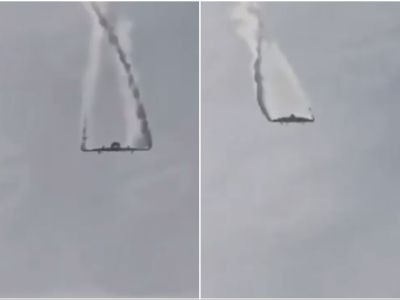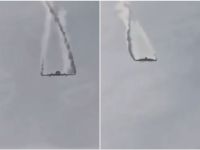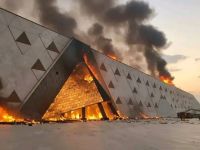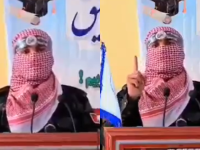An elderly woman reaches the last step of the mausoleum, her eyes fall on 28 neatly aligned coffins and she collapses weeping in the arms of her son.
Her sobs waft over through the congregation, until then gathered in silence around a brand-new mausoleum at a hillside cemetery overlooking Banja Luka, the Serb capital of Bosnia.
Other women in the crowd of peasant farmers and rural folk join in with cries of pain and grief. The men prefer to cough. Army cadets of an age too young to have fought in the 1992-95 Bosnian war stand solemnly to attention behind the coffins, which are draped in the blue, white and red colors of the Serbian flag.
Four hundred and fifty unidentified victims of the Bosnian war, soldiers and civilians, were buried here Saturday in a public ceremony after having laid piled up on the bare ground of an improvised morgue for five years.
Most of the coffins had already been placed in the crypt under the monument. The 28 coffins selected for the ceremony were identified only by a serial number and the location where they had been found.
"I have lost my only son, if I only knew that he was among these bodies here," a woman cries, one of several dozen mourners who came to pray without knowing whether or not they stood before the remains of lost loved ones.
Stana Dragoljic, 54, relates how for five years she and her husband Nenad have been tirelessly visiting the morgue in search of the remains of their son-in-law Ilija Teodosic, all the while knowing that they could only rely on the half-disintegrated clothing on the bodies to put an end to their uncertainty.
Before the burial, DNA samples were taken of each of the 450 bodies to make future identification possible.
Biljana Vasic, whose two brothers are among the 200,000 dead and missing from the Bosnian war, tells the congregation: "Five years have gone by and I still don't know what happened to them. I hope against hopes that they have been jailed somewhere and will come back some day. It is the uncertainty that is the worst."
Next, Nedeljko Mitrovic, who heads an organization of war victims in Bosnian Serb entity of Republika Srpska (RS), takes the microphone to read off the locations where the dead had been found. His litany is punctuated by the cries of those who seem to recognize a tragedy from the past.
Among the politicians attending the ceremony, RS vice-president Mirko Sarovic, member of the Serbian Democratic Party (SDS) of warlord Radovan Karadzic, bears silent witness the grief.
Seven Orthodox priests say prayers for the dead as candles are lit among the congregation. A praying woman does not notice the wax melting over her fingers.
Five cannons and an army platoon take turns to fire honorary salutes. A man in his 50s parts from the crowd and collapses on a coffin. He lifts up the flag and hugs the varnished wood. The cadets then begin to carry the coffins one by one to the crypt -- BANJA LUKA (AFP)
© 2000 Al Bawaba (www.albawaba.com)









